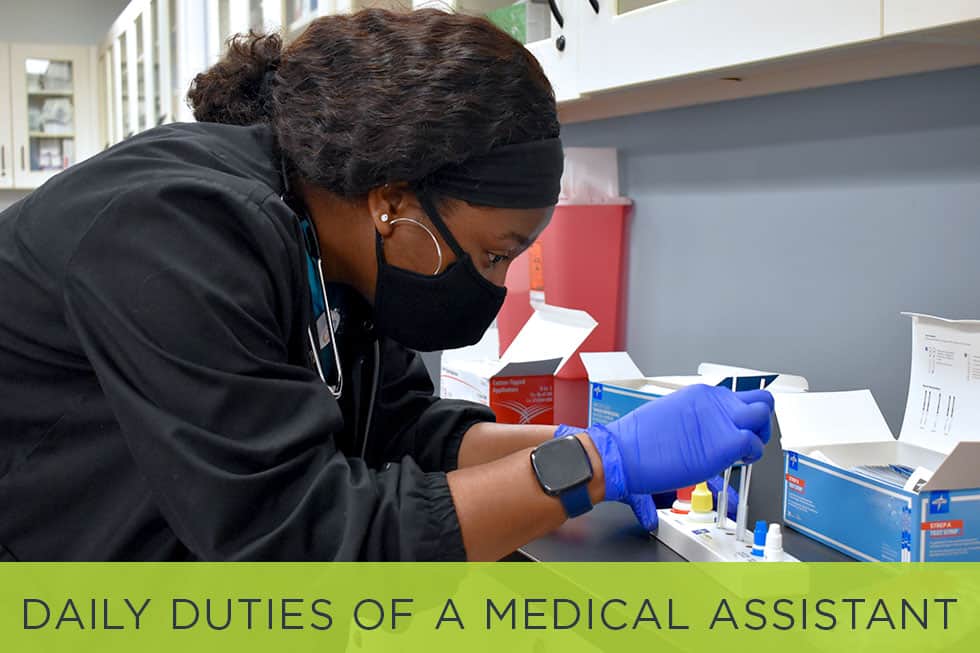What are the daily duties of medical assistants? We’re glad you asked! Because with a projected need for nearly 118,000 more medical assistants by 2031, it’s not only a healthcare career worth considering, it’s one that has long-term job security for the foreseeable future! But before we go any further, let’s break down the daily duties of a medical assistant.
Daily Duties of a Medical Assistant
Because these healthcare professionals perform such a range of clinical and administrative duties, it’s not surprising that wherever there are patients, you’ll usually find medical assistants. Medical assistants work in a variety of settings including urgent care clinics, physician offices, rehab centers, and more. On any given day, a medical assistant might perform some or all of the following duties:
- Assist doctors or nurses with patient exams or surgery
- Patient education and communication
- Set up and monitor EKGs
- Draw blood and prepare lab tests
- Sterilize instruments and patient rooms
- Prepare and administer patient medication
- Administrative tasks – manage medical records, patient scheduling, billing, insurance
- Record accurate patient history, vital signs, and current medical status (triage)
Additionally, there is a wide range of other positions that are commonly filled by Medical Assistants and the opportunity for advancement. These roles include Lab Support, Phlebotomist, Scribe, Emergency Room Technician, Electrocardiograph (ECG) Technician, Clinical and Administrative Practice Managers, Medical Coordinators, Billing Department, Office Managers, and even Instructors.
Career Outlook
With projected job growth for medical assistants in the foreseeable future, let’s talk about compensation for medical assistants. The salary for medical assistants is projected to grow at a rate of 16% by 2031. With job security and wages anticipated to rise, prospects for medical assistants look positive.
Additionally, there is a wide range of other positions that are commonly filled by Medical Assistants and the opportunity for advancement. These roles include Lab Support, Phlebotomist, Scribe, Emergency Room Technician, Electrocardiograph (ECG) Technician, Clinical and Administrative Practice Managers, Medical Coordinators, Billing Department, Office Managers, and even Instructors.
How do you Become a Medical Assistant?
Every state differs somewhat in their requirements for becoming a medical assistant. However, the majority require completion of an accredited training program. Most programs provide both clinical and classroom training and include an onsite clinical lab for students to gain hands-on experience. Depending on the program, students earn a diploma or certificate and are eligible to take the Registered Medical Assistant (RMA) exam administered by the American Medical Technologists. It’s important to note that even though some states don’t require certification, many employers prefer to hire certified medical assistants.
Characteristics of a Medical Assistant
-
Empathic
Medical assistants are often dealing with patients and their families during the most challenging times. That is having genuine concern and empathy for patients and their families is essential.
-
Excellent communication skills
Being able to communicate effectively is critical for a medical assistant. Not only to interact with patients and other healthcare professionals, but also so that they clearly understand instructions from doctors, nurses, and other healthcare professionals.
-
Organized/detail-oriented
Great time management and organizational skills are a must for medical assistants. After all, medical assistants are documenting patient data and records, and the smallest details are very important.
Medical Assistant Training Programs
One of the best things about pursuing a career as a medical assistant is it’s a fast-track healthcare career. Most programs can be completed in less than one year. If you’re looking for a medical assisting training program in your area, there are a few things to consider.
Does the program offer hands-on experience?
Many employers are looking for medical assistants with practical experience. So, look for a program that offers an externship or clinical training that allows you to practice your skills in a real-world setting.
How long is the program?
If you’re looking to get into the healthcare workforce quickly, you should look for an accelerated program. For example, the medical assistant program at MedQuest College offers a 10-month program that also includes an externship in an actual clinical setting, making it an ideal option.
Does the program include placement assistance?
Once you complete your training as a medical assistant, you’ll be ready to look for work. However, if the program offers career placement services, you can get on the path your future career even faster! MedQuest provides direct career placement assistance to graduates that includes resume preparation, interviewing techniques, and help with networking.
It’s safe to say that working as a medical assistant can be a fulfilling career path. Not to mention working with people from all walks of life means you’re not likely to find a career in medical assisting dull or ordinary. MedQuest College is helping students get the skills and training they need to launch careers in the growing healthcare industry. If you’d like to learn more about careers in medical assisting, contact us today or call us at 859-402-1035.

